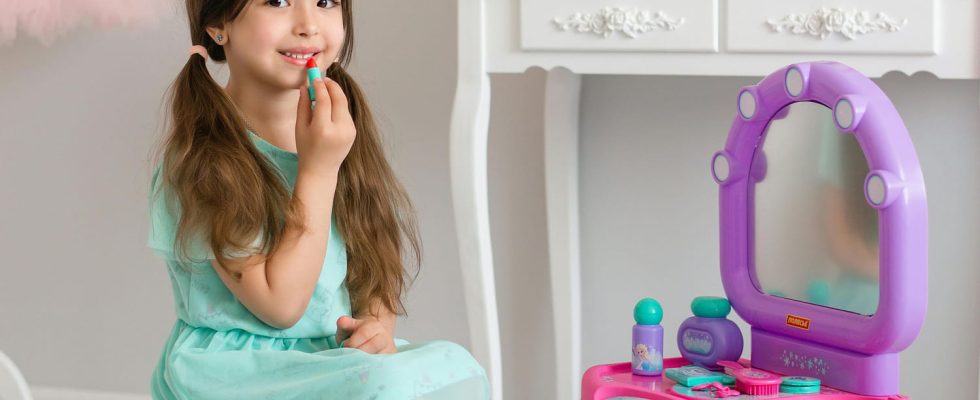Treatments, mascara and lipstick… Does your child want to be like mom (or like her friends)? But at what age can you let your daughter wear makeup and with what products? Update with Professor Misery, dermatologist.
The younger generation is increasingly influenced by the beauty videos that they watch en masse on social networks. If children tend to want to imitate mom putting on makeup, parents all ask the same question: at what age can you let your daughter put on mascara, lipstick or nail polish to go out? on the street or go to school?
At what age can my child wear makeup?
For Isabelle Rousseaux, dermatologist and member of the National Union of Dermatologists, “you have to wait until the skin is ready and able to defend itself before wearing makeup, even for children. It is advisable to wait until the end of puberty“The specialist insists that children’s makeup should remain occasional and not be applied to the youngest.”If little girls regularly wear makeup outside of one-off events like a party or birthday, they risk becoming sensitized to makeup and becoming allergic.“she tells us.
- If you use makeup (occasionally) for your child, choose makeup that can be removed with water, and don’t let your child keep it on for too long.
- Before any application to the skin, carefully read the instructions for use and the warnings indicated on the packaging or the leaflet.
- Carefully remove makeup from the skin with water and a mild soap or a cleansing milk appropriate for your child’s age and then apply a moisturizer.
- Finally, avoid buying makeup products on websites (outside the European Union) because health standards are less restrictive than in Europe for manufacturers.
What beauty products are suitable for children?
There is a real emergence of beauty and facial care products aimed at a young audience. With their delicious scents and their fun and colorful packaging, they have everything to please. Shower gels with childhood scents (chocolate, candy apple, candy, etc.), manufacturers do everything to seduce children and their parents. Certain brands, like Too Fruit, d’Enfance, etc. offer hygiene and care products for children. Their credo? Of the organic products, without chemicals, 100% made in France. Even if they highlight a paraben-free and pH-neutral composition, or even French manufacturing, we must remain vigilant and always think about look at the composition. Moreover, “there is no medical benefit. This is an attempt by marketing to expand the cosmetics market and even to condition children very early on to use cosmetics.“, explains Professor Laurent Misery, dermatologist*.
How useful are hygiene products for children?
Children aged 6 to 12 do not produce sebum. But does their skin still need to be hydrated? “Absolutely not ! This is of no benefit, except in the case of atopic children or those who have other diseases causing dry skin.“says the dermatologist.”We can even think that the use of moisturizing creams prevents the production of the skin’s natural moisturizers. It could therefore induce dry skin in those who did not have it initially, especially in children. Some people talk about cosmetic dependence.”
Children’s makeup: what are the risks of allergies?
Hygiene and care products suitable for children can be used every day unless children have one or more skin conditions. Professor Misery, however, questions the real benefit of using skincare products daily. He also explains that he does not advise “no products apart from hygiene products and of course, emollients, but only if the child has a skin disease“At present, allergies to cosmetics are not common among children. However,” the earlier we use cosmetics, the more allergies will gradually appear“, explains the dermatologist. As for makeup, it is essential to check its composition, especially when the products contain components that can have harmful effects. Before letting your child use skincare products or makeup, it is essential to take a look at the components (and this also applies to you!). We therefore forget parabens, recognized as endocrine disruptors, but also phenoxyethanol, methylisothiazolinone, synthetic perfumes…
